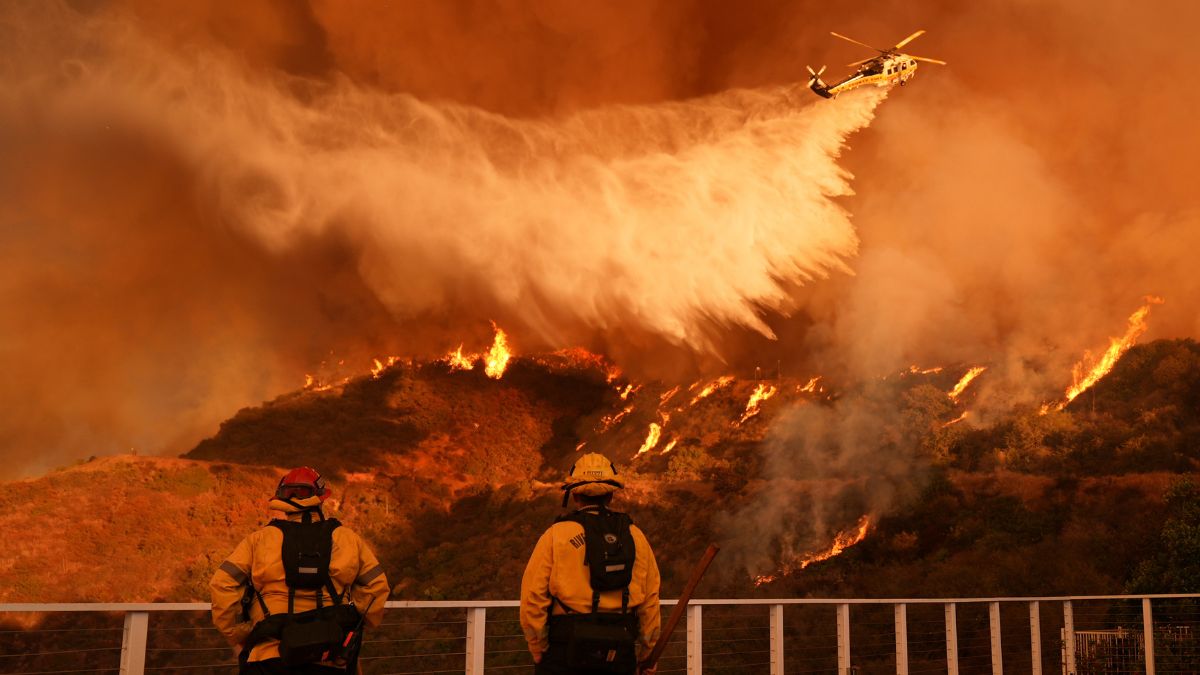Are a billionaire couple in California hoarding water amid wildfires?
That’s the claim that is going viral on social media.
Stewart and Lynda Resnick, an ultra-wealthy couple from California, are being accused of hoarding water when it is most needed.
But what do we know about them? And are they really hoarding the water?
Let’s take a closer look:
Who are they?
According to CBS, Stewart and Lynda Resnick are owners of the Wonderful Company.
This private firm, which is headquartered in Los Angeles, was established in 1979.
It is currently valued at $6 billion.
The Resnicks through the company own Wonderful Pistachios, POM pomegranate juice, Halo tangerines and Fiji Water.
With a net worth of $13 billion, they are said to be California’s richest farming family
As per Snopes, the Wonderful Company owns 140,000 acres of land – a vast majority of it in California.
The company says it is one of the largest food producers in the world.
It claims to grow a significant amount of its produce in California.
The Resnicks are also famed for their love of art.
As per ArtNet, the Resnicks decorate their Beverly Hills home with paintings from Picasso, Jean-Honoré Fragonard, and François Boucher.
They are known for their fondness for European and Old Masters.
The couple also donate heavily to Los Angeles museums.
They have given the Hammer Museum at least $30 million, while they have bestowed $90 million on the Los Angeles County Museum of Art (LACMA)/
They are also known for caring about the environment.
In 2019, they gave Caltech $750 million to work on climate research.
But none of that is why the Resnicks are in the news.
As per Fortune, it is their 57 per cent stake in the Kern Water Bank Authority – which they own through their private firm – that has come under scrutiny.
The authority runs a series of reservoirs and pipes near California’s Bakersfield – which stores around 488 billion gallons of water.
Since the fires broke out in January, numerous posts on social media have claimed that the Resnicks owned “most of the water in California.”
The posts also claimed that the Resnicks were ‘hoarding water.’
Are they really hoarding the water?
The short answer is no. But we’ll come to that later.
First, let’s take a brief look at California’s water system.
Snopes quoted Max Gomberg of the California Water Impact Network as saying that no one really owns the water per se.
Instead, the water is held in a trust for the people of the state.
In 1994, California executed the Monterey Plus Agreement – where it privatised some of the water’s storage and management.
Under this agreement, the Wonderful Company became part owners of the Kern Water Bank Authority – which is around 240 kilometres from Los Angeles .
The firm owns 57.7 per cent of the Kern Water Bank Authority – which can hold around 1.5 million acre-feet of water.
That may sound like a lot.
But California uses around 40 million acre-feet of water every year.
So, going by that metric, the Wonderful Company uses just 3.75 per cent of the state’s water.
Fortune quoted California’s Department of Water Resources (DWR) as saying that reservoirs across California had 23.9 million acre-feet of water/
The total ground water in California is from 850 million to 1.3 billion acre-feet.
So blaming the Resnicks really makes no sense.
“There’s a lot of finger-pointing and sort of like picking who you don’t like and blaming them,” Brad Franklin, a water resource economist and research fellow at the Public Policy Institute of California told Fortune. “It’s silly to pick one major water user in the San Joaquin Valley” and say it’s their fault.
And as for the water bank, it is simply a public-private partnership.
It gathers water to use in times of drought and stores it.
The water bank “of course contains a large amount of water but there’s no direct connection between [the Resnicks and the water bank] and what’s going on in Southern California,” Franklin added. “There’s no real reason to believe things would be different if the Resnicks or any other large agricultural businesses used less water.”
Besides, the real issue with the fires in Los Angeles isn’t the lack of water.
Indeed, officials have repeatedly said the city has enough water locally but the problem is getting the water to the firefighters where they need it.
“The system has never been designed to fight a wildfire that then envelops a community,” Martin Adams, the ex-general manager of the Los Angeles Department of Water and Power, told the Los Angeles Times.
Felicia Marcus, Former Chair of the California State Water Resources Control Board, agreed.
She told CBS, “What’s happening in LA is not because there’s not enough water in LA in storage. There are no urban water systems that are built out to handle a firestorm like this.”
Seth Oster, chief corporate affairs officer for the Wonderful Company, told Fortune it is “hard to be surprised anymore by the disinformation and ignorance on social media, but in this case, the hamster wheel has spun to a new level of absurdity.”
Oster also said the “false” claims against the company are “often openly rooted in anti-Semitism.”
With inputs from agencies
)